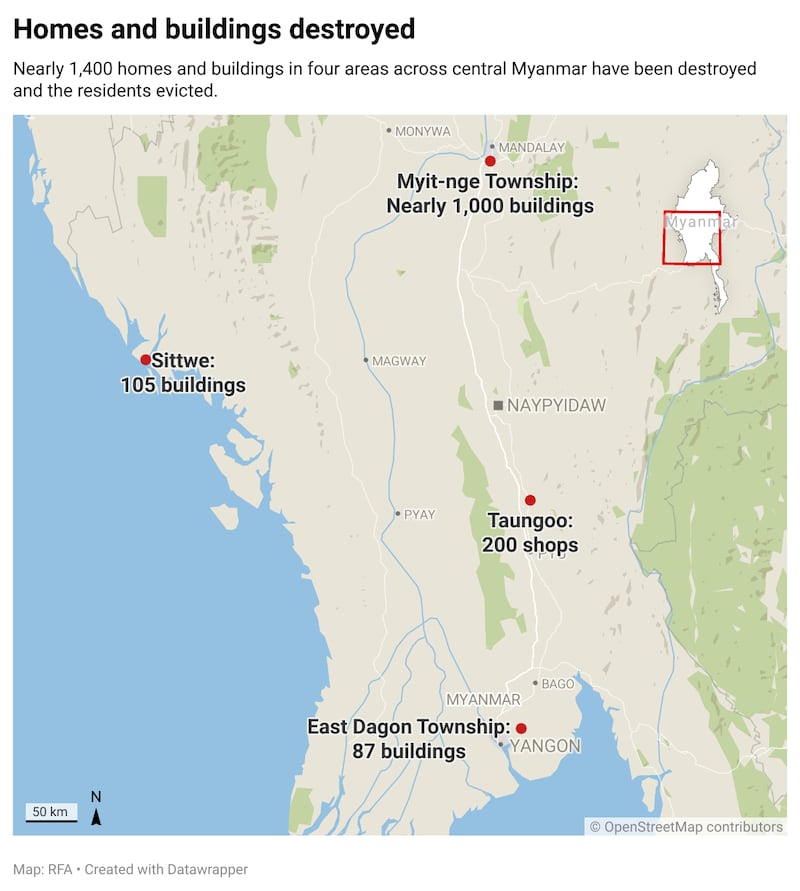Hundreds of people are homeless in Myanmar as the ruling junta razes city slums in a campaign it says is designed to strengthen the “rule of law” but an analyst said is likely a pretext to root out members of the armed resistance or secure lucrative land development deals for military officers.
Since early December 2021, authorities have destroyed 1,392 structures in the slums of urban centers that include Yangon’s East Dagon township, Mandalay’s Myit-nge township, Bago region’s Taungoo township, and the Rakhine state capital of Sittwe, residents told RFA’s Myanmar Service.
They said 87 residential buildings were torn down in East Dagon’s Dawei Chaung ward in December, while since the beginning of March, demolition crews have knocked down around 1,000 buildings —including a train station and shops — in Myit-nge, 200 shops in Taungoo, and 105 buildings in Sittwe.
Nearly 500 people have been left homeless by the demolitions over the past three months, sources said.
Sai Kyi Zin Soe, a political analyst, said that the military is evicting squatters and destroying illegal settlements in the country’s slums based on an assumption that anti-junta elements operate there.
“They might believe it is necessary to remove these people because they find it politically difficult to administer the area,” he said. “However, another reason could be for their own benefit. It is possible that investors and the junta’s cronies are taking the opportunity to clear the land at a time when the political situation is unstable.”
A resident who witnessed the destruction in Taungoo told RFA that soldiers, police and municipal workers used heavy machines on March 12 and 13 to flatten shops and houses in parts of the township they said were “encroaching on municipal land.”
“The shops were bulldozed overnight. Some of them were built with reinforced concrete, but they were all cleared up within a few hours,” the resident said. “They also demolished everything along Kan Road, Market Road and the Yangon-Mandalay Highway. They were using five forklifts and a backhoe while soldiers and police monitored the demolition.”

A resident of Myit-nge, where the township’s residents are mostly railways department employees, said nearly all the houses in town had been demolished. They said that those who did not leave the area are now living in makeshift tents near the site of their former homes.
“Almost the entire town is gone — it’s all been demolished,” the resident said, adding that the military had blocked off the area on March 5 and sent construction vehicles there three days later. “We saw buildings torn down by backhoes. The armed soldiers stood by and watched.”
Most of the wells in the area have also been demolished, leaving some people without access to clean drinking water. Residents told RFA that people had been donating meal packets and drinking water to the displaced and providing free transportation.
When asked by RFA about the demolitions, junta Deputy Information Minister Maj. Gen. Zaw Min Tun said the military regime is now focusing on the “rule of law” after previous governments ignored illegal settlements.
“When it comes to rule of law, there are some areas that are worrisome. We need to clear them up as the rule of law is at stake in those areas,” he said. “Some squatters have been cleared and plans are afoot to relocate them.”
However, a man whose home was destroyed on Dec. 4 by authorities in East Dagon said that he and others had yet to be resettled.
“We lost everything, including our rights, after the Dec. 4 eviction. We applied, hoping to get back the land at government rates, in accordance with the law,” he said. “After a week or so, they replied to us that none of the evicted people would be relocated anywhere or get any help.”
Among the buildings demolished in East Dagon were eight monasteries, he said. An appeal made to the junta’s Ministry of Religious Affairs for the return of the land was ignored.
Some whose homes were destroyed in Yangon said they had been forced to rent apartments in the city’s suburbs, leaving them with no money for emergency medical treatment if they fell ill.
People interviewed by RFA said that junta officials in urban areas are continuing to remove people they consider illegal squatters on state land by issuing eviction notices and using force when they encounter resistance.
Authorities have killed at least 1,679 civilians and arrested 9,745 since the military seized power in a Feb. 1, 2021, coup, mostly during peaceful anti-junta protests, according to the Bangkok-based Assistance Association for Political Prisoners.
Reported by RFA’s Myanmar Service. Translated by Khin Maung Nyane. Written in English by Joshua Lipes.
